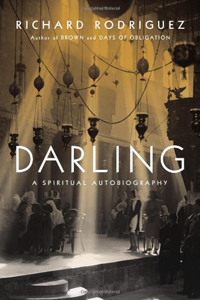Book Notes
 Richard Rodriguez, Darling; A Spiritual Autobiography (New York: Viking, 2013), 235pp.
Richard Rodriguez, Darling; A Spiritual Autobiography (New York: Viking, 2013), 235pp.
Richard Rodriguez (b. 1944) belongs to a dwindling group of public intellectuals whose gift is to elucidate our civic Zeitgeist, which by his reckoning is one of "religious extremism, public atheism, and digital distraction." He also happens to be openly gay, devotedly Catholic, and Hispanic, which makes for a provocative vantage point. Rodriguez was born into a Mexican family and schooled by the Irish Sisters of Mercy, to whom he dedicates this book with unapologetic fondness. The sub-title is misleading, because the book isn't a linear narrative of faith but a wide-ranging collection of essays.
After the terrorist attacks of 9/11, Rodriguez began to reflect on the desert as the common birthplace and abiding influence on the three religious cousins — Judaism, Christianity, and Islam. The fullness of religious revelation came in the emptiness of the desert. Despite the influence of Western Europe on Christianity, after 9/11 he realized that the God of these three faiths is "a desert God." After September 11, "I started describing myself as 'Judeo-Christian-Muslim.'" The desert provokes essays on Las Vegas and the Holy Land, Cesar Chavez and Mother Teresa, clogged California freeways, the demise of newspapers, and the role of women in the formation of his faith.
Why does Rodriguez stay in the church? He reflects on his atheist brother, and the zeal of Christopher Hitchens. He considers the atrocities performed in the name of his God; indeed, Pope John Paul II issued more than ninety formal apologies ("a virtual history of western civilization"). As a gay Hispanic he's experienced hate and exclusion. He stays in the church, he says, because the church is "more than its ignorance. The Church gives me more than it denies me. I stay in the Church because it is mine."


